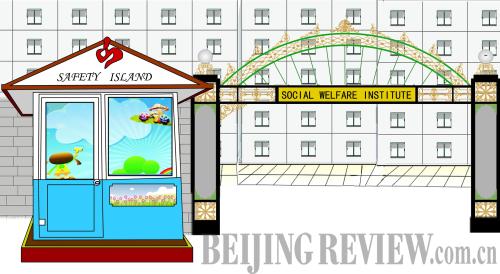|
 |
|
(LI SHIGONG) |
In June 2011, a social welfare institute of Shijiazhuang, capital city of north China's Hebei Province, built a special room, named "safety island," outside the gate of the institute to receive abandoned babies. By doing so, the organization hopes to protect abandoned babies and save their lives.
According to the institute, the special room is equipped with incubators and exhaust fans. Watch keepers check the island every two hours. If someone places a baby in the incubator, he or she can press the delayed alarm button to make the baby discovered. By the end of January 2012, a total of 26 abandoned babies had been found there.
But the move of the institution has been a source of controversy. Some people argue that abandoning babies is illegal, and such a facility will only encourage irresponsible behavior and lead to a rising number of abandoned babies.
Responding to these voices, Han Jinhong, head of the institute, said that since the room was put into trial use eight months ago, the survival rate of the abandoned babies they received had jumped to 67 percent. The figure in the past was no more than 50 percent, as most babies the institute received were under 1 year old, suffered from disabilities or illnesses and had sometimes even been left on the streets. The special room offers abandoned babies a shelter from adverse conditions like wind and rain, so the time they need in hospital will be greatly reduced. "We can't change immoral behavior, but we can reduce the harm of such behavior," Han said.
In recent days, the special room outside the social welfare institute for abandoned babies has become a great concern of the public again. Most people regard that such a shelter is the best temporary home for these poor babies.
Lin Xiao (www.cnhubei.com): In all ages, baby abandonment is a behavior condemned by the public. So it comes as no surprise that the "Safety Island" in Shijiazhuang, as a temporary shelter for these poor babies, met with great controversy. However, it's not rational to blame it for indulging baby abandonment.
Welfare institutions have a responsibility to receive abandoned babies, and all of us have become accustomed to the continuous appearance of homeless babies in such organizations. The same is true of the special shelter built by welfare institutions. In nature, as a part of the welfare home, a special shelter for abandoned babies built by welfare institutions symbolizes the extension of the functions of these organizations. In this sense, the "safety island" in Shijiazhuang deserves public recognition and praise.
Despite the fact that baby abandonment is prohibited by law, such cases keep emerging in China. Take southwestern Guangxi Zhuang Autonomous Region for example. From 2002 to 2005, the Social Welfare Home of the region received more than 13,000 abandoned babies, most of whom were girls. Frequent occurrence of baby abandonment reflects an absence of family love and a lack of legal consciousness. Even worse, such illegal behavior always happen in remote areas, which may lead to accidental injuries or even death of these poor babies. With the establishment of a special shelter, the mortality rate will be reduced to a large extent. From this perspective, the "Safety Island" for abandoned babies in Shijiazhuang is an expression of humanity, and the initiators deserve respect and admiration.
From June to November 2011, the "Safety Island" received 21 babies, while the Shijiazhuang Social Welfare Institute registered a total of 75 babies, lower than 83 in 2010 and 105 in 2009. Statistics indicate a decline of the number of abandoned babies, proving that the above-mentioned worries are groundless.
Baby abandonment is not rare in the world today. Since it's almost impossible to get rid of it in the foreseeable future, we should have compassion for abandoned babies and protect them from potential danger by setting up special asylums. It will trigger more thought about the extension of charity organizations' functions and the understanding of the principle of "people first." In short, the "safety island" is a new form of charitable aid and is worth more resource input.
| 